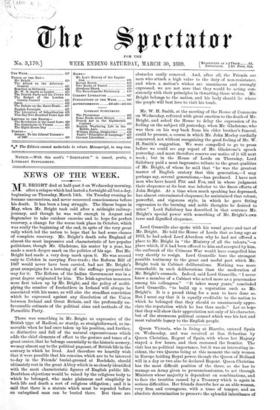There was something in Mr. Bright so expressive of the
British type of Radical, so' sturdy, so straightforward, so im- movable when he had once taken up his position, and further, so distinctive and full of the natural expressiveness which adds the chief elements of effect to the gesture and tones of a great orator, that he belongs essentially to the historic scenery, we may almost say to the political pageant, of British life in the century in-which he lived. And therefore we heartily wish that it were possible that his remains, which are to be interred to-day in the Friends' burial-ground at Rochdale, should ultimately rest in the great Abbey which is so closely identified with the most characteristic figures of English public life. Doubtless objections would be raised by the religious body to which he belonged, who make plainness and simplicity in both life and death a sort of religious obligation ; and it is said that there is a statute which must be repealed before an nnbaptised man can be buried there. But these are obstacles easily removed. And, after all, the Friends are men who attach a high value to the duty of non-resistance, and when a , nation's wishes are unanimous and strongly expressed, we are not sure that they would be acting con- sistently with their principles in thwarting those wishes. Mr. Bright belongs to the nation, and his body should lie where the people will best love to visit his tomb.


















































